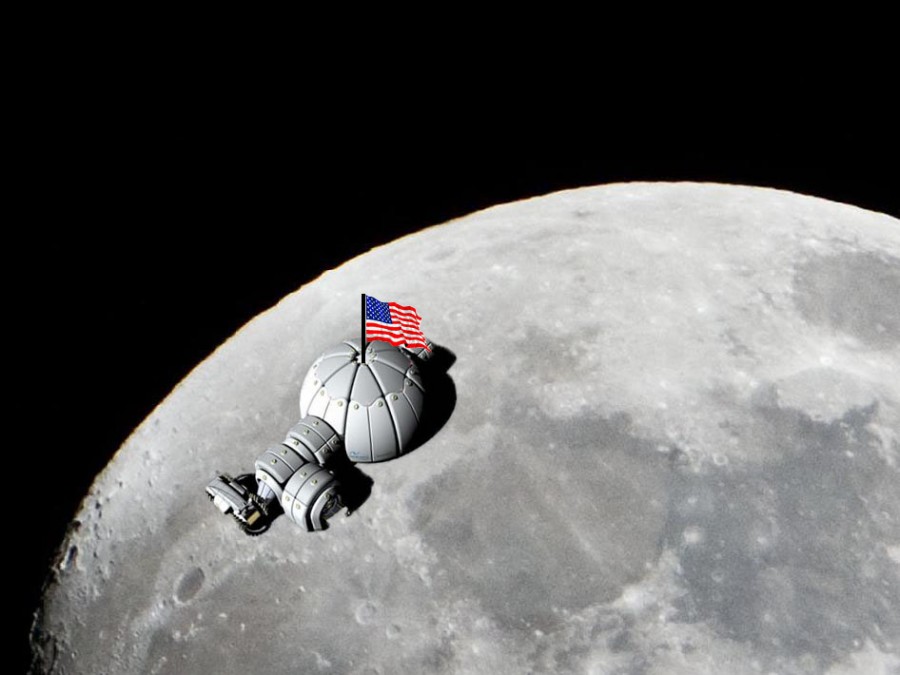Moon Colonization: Why we should!
We, as humans, are known for our curiosity, our ambition. We have jumped continents and oceans; we have even taken our presence farther than our atmosphere. And everywhere we have gone, everywhere we have explored, we’ve taken the bull by the horns and done what we’ve had to to not only survive, but thrive. Now, our frontiers on our home planet have dwindled. So we as a species turned our heads upward, and in 1957 the Russians sent our first earth made object into space: Sputnik I; thus, the space race began. Now, it is the United States’ turn for its Sputnik moment; one which will exceed all other space ventures. The U.S. should pioneer a venture into the colonization of our moon.
There are a couple reasons why colonizing the moon is a good idea. Before I elaborate, it should first be noted that colonization in this context is more accurately described as putting a semi-permanent human presence on the moon, rather than actual human beings, as that is the most practical utilization of this ‘new frontier’. The more permanent aspects of the colony would be robotics and automation.
Reason 1: Research
No Interferance
The moon, particularly the dark side, is a pristine location for the placement of research telescopes. It is free of most of the problems terrestrial or in-orbit telescopes face: particularly, atmospheric and radio interference. The dark side of the moon would be free of all earthly interference, providing us with perhaps the most accurate and detailed images of our universe ever made.
Diminished Gravity
The moon’s low gravity makes it a perfect place to launch deep-space missions with minimal cost. While the Earth has an escape velocity (the velocity required for an object to escape the gravitational field of a planet) of 8 km/s or about 17,900 mph, the escape velocity of the moon is 2.78km/s or about 6,200 mph. This means that the fuel necessary to propel a large spacecraft off the moon is less than a fourth of that required for the earth.Reason 2: A Space Station
Construction
Obviously, it wouldn’t make sense to launch space missions from the moon if they first had to come from earth, but this wouldn’t be a problem if all spacecraft were built on the moon. Lower gravity would result in lower weight and, consequently, lower energy necessary to move building materials.
Repair and Rest
As a space station, the moon would provide a ‘pit stop’ for missions sent to other planets. There, refueling and resupply could be done easily and efficiently. It would also provide a convenient station to send repair missions to sattelites or the ISS. Clearly infrastructure would be a necessary prerequisite before this could be done, but it could, in the long run, greatly increase the efficiency of deep-space exploration and missions.
Reason 3: Mining and Resources
Mining is a toxic and environmentally disastrous operation if done on our planet; however, it is cleaner, more efficient, and less destructive on the moon.
Minerals and Metals
Since the moon was once a piece of the Earth, it is full of rare earth and common metals that are otherwise difficult to find or retrieve on Earth but very important for everyday life and technology. While it may not be completely practical, especially with current technology, to mine and then send raw materials from the moon to earth, it is definitely practical to mine and utilize the various materials on the moon for operations involved in the previous two reasons.
Water
Despite common belief, water is in fact and abundant resource on our moon, albeit entirely frozen. With the vast supply of water, it could effectively provide more than enough for whatever personel reside on the moon with enough to spare to produce hydrogen and oxygen, both of which are vital resources for the moon colony (air and fuel).
Helium-3
Helium-3 is a rare material here on our planet. It is only found abundantly deep in our oceans. It is useful for fuel, power plants, and production of construction materials. With its abundant supply that resides on the moon, there would be no more shortages of such a vital isotope.
Helium-3 is a rare material here on our planet. It is only found abundantly deep in our oceans. It is useful for fuel, power plants, and production of construction materials. With its abundant supply that resides on the moon, there would be no more shortages of such a vital isotope.

With the sheer volume of numerous untapped resources dwelling underneath our moon’s surface, there is little other than bureaucracy holding us back from research, construction, and initiation of the process to colonize the moon. When faced with this path of pioneering or settling, as so many of our ancestors have been faced with, do we want to side with those who threw in the towel and remained content with the status quo? Or do we want to join the side of history with those who pioneered the Wild West, or crossed the Atlantic in 1472, or pushed out of Africa in our species’ infancy? We are not a nation of settlers. We are a nation of pioneers, and we do these things not because they are easy, but because they are hard. That’s who we are as Americans; that’s who we are as humans.









